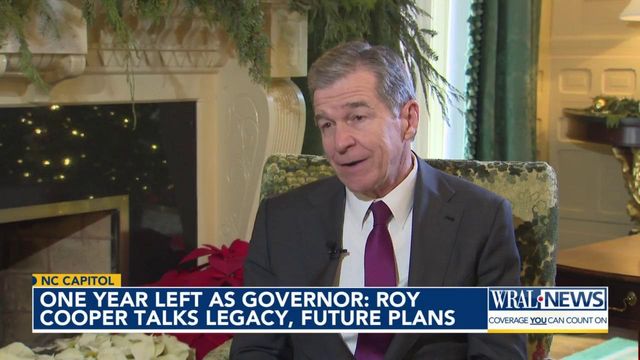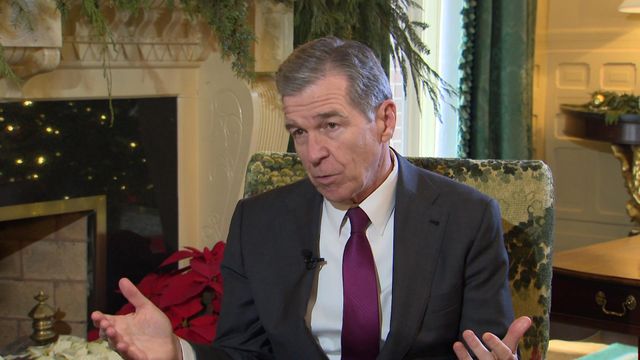One year left as governor: Roy Cooper talks legacy, future plans with WRAL
As he prepares to enter his final year as North Carolina’s governor, Roy Cooper has a lot on his mind: His legacy and future plans, the goals still left to accomplish in the next 12 months and, like many this time of year, who’s in charge of cooking Christmas dinner.
Cooper spoke with WRAL on Wednesday about all that and more.
Less than two weeks ago, he watched one of his top political priorities become reality when Medicaid expansion went into effect on Dec. 1. It will give federally funded health insurance to around 600,000 North Carolinians, most of them working in jobs that pay low wages and don’t offer benefits.
“It, I think, is one of the most important things that has happened this year, and for the years, and maybe even decades to come,” Cooper, a Democrat, told WRAL. “And I think about the fact that people have been struggling with this for so long, and these people are childcare workers, the people who stock our grocery shelves, the people who look after our seniors, those hard jobs.”
Cooper’s two terms as governor have been largely defined by the antagonistic relationship between him and the Republican-led General Assembly. He won the battle over Medicaid expansion but has seen plenty of losses, too, on issues like stricter abortion laws, looser gun laws and massive corporate tax cuts — key GOP priorities that Cooper and Democratic legislators failed to stop.
But he told WRAL he’s proud of areas where he and the legislature have found some common ground.
Beyond the long-delayed Medicaid expansion agreement, both sides also take credit for North Carolina ranking as CNBC’s No. 1 state for business, for the past two years in a row. They’ve also worked together on growing the incentives programs that pay businesses to move to North Carolina, or to reject offers from other states trying to poach them away. Republicans were critical of his approach to COVID-19 lockdowns, but three years removed it doesn’t appear to have hurt the state’s economy.
In all, Cooper said, he thinks he has had a good run — with a bit more time left to tackle some final challenges, until his last day arrives in January 2025.
“I can see positive things happening,” Cooper told WRAL. “Yeah, there are challenges. Oh my goodness, there have been so many challenges in these seven years. But I see the progress and the difference that we've made. So I'm looking forward to the next more-than-a-year that I have. I'm going to value every single day.”
What’s next for Cooper?
There’s broad speculation in the political world that if Democratic President Joe Biden is reelected in 2025, he could pick Cooper for a high-profile job in Washington. Already Biden has looked to North Carolina for his top environmental regulator (Environmental Protection Agency Administrator Michael Regan) and a major public health leader (Centers for Disease Control Director Mandy Cohen), both of whom served in similar roles in state government under Cooper first.
Cooper said he’s trying to keep focused on the job he has now rather than what job he might have in a year or two.
“What's next for me, I do not know a really honestly don't know at this point,” he said. “But I think that as governor, you’ve got to continue to lead. I'm going to continue to recruit these businesses, we're going to continue to fight for clean air and water, we're going to continue to fight for women's reproductive freedom.”
It’s also possible he’s not finished with politics quite yet and could have his eyes on the 2026 elections, when a North Carolina seat in the U.S. Senate will be up for grabs — or in 2028, when many state and national races will be on the ballot.
Priorities for his final year
The 66-year-old Cooper says he now gets much of his best work done early in the morning.
It’s a big shift from his early days as a politician — he was first elected to the state legislature in 1986 — when he used to prefer working late into the night, he said.
“Now, I’m getting up very early, tackling things and getting ready for the day,” he said. “And you know, I will often talk to three, four, five groups. Have a lot of meetings. So I want to make sure that what I'm saying is the most effective way that I can put it.”
Cooper has staked a lot of political capital, as well as real money, on the clean energy industry: In meetings with tech and auto executives from Durham to Japan he has pitched North Carolina as being on the leading edge of the emerging electric vehicle industry. The state has then backed up that pitch with billions of dollars in taxpayer-funded incentives meant to lure the companies here.
The governor’s bet is that once the state has established itself as having the trained workforce and efficient supply chain that companies are looking for, the investments will snowball and grow exponentially: “We know these jobs are going to be great,” he said. “And we know that it is needed, for American security, to make sure that these jobs are right here in America.”
Continuing those job-recruitment efforts will be a key focus of his in 2024, Cooper said. So will fighting with Republicans on abortion access — a push that will continue after the General Assembly voted this year to slash the cutoff for most abortions nearly in half, from 20 weeks to 12 weeks.
Cooper said the biggest single challenge for him next year, as well as whoever takes over as governor after the 2024 elections, will be working to improve public schools. And that will require putting significant political pressure on GOP leadership at the state legislature, he said.
Cooper and fellow Democrats have fought against charter school expansion and taxpayer-funded vouchers for private school tuition, even as polling shows the school choice movement is gaining bipartisan support.
He particularly opposes private school vouchers, saying those schools have no accountability and that there’s no evidence their students perform any better on key academic measures than public school students.
“I'm very concerned about our K-12 schools, and that the legislature is not providing the investments that we need to make sure that we have great schools,” Cooper said, adding that he thinks the state legislature should be pressured into ending the voucher program and instead increase funding to public schools.
The legislature massively expanded the voucher program this year to allow even wealthy families to get taxpayer subsidies for their tuition.
“We also don't need to take billions of dollars that could be going to our public school students, putting it in this unaccountable private school voucher program on steroids,” Cooper said. “These private schools, I don't have a problem with them. What I do have a problem with is using taxpayer money to fund the private schools, at the expense of public schools.”
Holiday plans
Cooper also spoke with WRAL about his family, particularly his wife Kristin and their three daughters who, he said, “take the good and the bad with both of their parents being in the public eye, but they're their own people.”
Being governor comes with some perks, like the mansion in downtown Raleigh as well as a second residence in Asheville. Cooper said they won’t be doing a mountain Christmas this year. The plan is to stay in Raleigh — and to keep him out of the kitchen.
“We have some traditions that we like to keep,” he said. “There's very specific things that our daughters want Kristin to fix. Nothing for me, because I'm not the cook. But she's a great cook. And so we're looking forward to that time together.”











